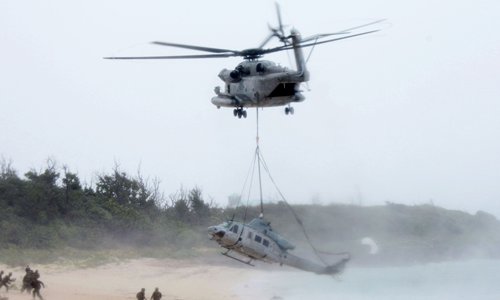
A US CH-53 helicopter (top) on January 8, 2018 lifts a UH-1 helicopter that made an emergency landing two days earlier on a beach in Uruma, in Japan's Okinawa Prefecture, amid safety concerns among local residents. (Photo: VCG)
A majority of voters in a referendum in Okinawa opposed a Japanese government plan to relocate a US military base in a southern island, with many local residents stressing the hope that the base could be moved off the islands altogether.
Some 72 percent voted against the move with 19 percent in favor from a 52 percent turnout, the Okinawa government said.
An opinion poll by the Asahi Shimbun found 80 percent of respondents want Abe's government to respect the referendum results, AFP reported.
But the non-binding referendum is unlikely to thwart Japanese Prime Minister Shinzo Abe's plan, as he pushes for relocation based on a deal reached two decades ago between Japan and the US.
Okinawa is home to about half of the 54,000 US troops stationed in Japan and houses the largest US air base in the Asia-Pacific region.
Tokyo plans to relocate the US marine corps air station Futenma from the urban area of Ginowan City to less-populated Henoko Bay in Nago City in the northern part of Okinawa.
Okinawa accounts for less than 1 percent of Japan's total land area, but hosts nearly 70 percent of the US military personnel in Japan, said Huo Jiangang, an expert on Japanese studies at the China Institutes of Contemporary International Relations in Beijing.
Reports have suggested that the US military presence has frustrated residents with problems including noise, pollution, military accidents and crime.
Former Okinawa governor Takeshi Onaga was staunch about moving the US base off Okinawa and was often at loggerheads with Tokyo over its compromise plan to merely move the base to another part of the island.
After Onaga died last year, his successor Denny Tamaki stepped into his shoes and demanded Tokyo accept the "firm decision" of the Okinawa people.
Those who oppose the move want to see the base relocated outside of Okinawa, arguing responsibility for hosting US troops should be more evenly spread across Japan.
Okinawa Island is the largest of the Okinawa islands and the Ryukyu islands, a chain that stretches southwest from Kyushu to Taiwan island. Some Chinese scholars have questioned Japanese sovereignty over the chain.
Okinawa is considered by Chinese experts as an important US military base for its strategies in Asia, especially in containing China.
"The relocation was not a big problem decades ago, as the central governments often stalled in handling the problem," Huo told the Global Times.
The Okinawa people's resistance was unlikely to derail Abe's plan, Huo said.
"If it is relocated, there will be new problems such as environmental protection as land must be reclaimed from the sea to set up a military airport."
With thawing relations between North Korea and the US, the Abe government should reconsider whether Okinawa should host such a large foreign troop presence, Huo said.


